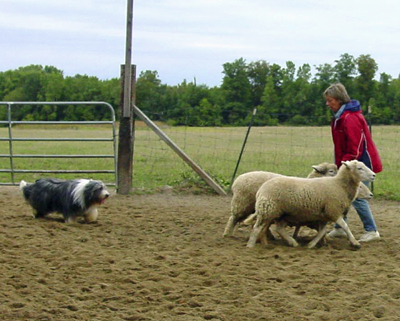
Does A Beardie Have Balance?
by Lois Gaspar
Does a Beardie have balance? That is a question to which you may receive differing answers; however, if you want to herd with your Beardie it is important to understand the concept of balance. I have heard balance described as the dog being at twelve o’clock and the handler being at six o’clock and this is not necessarily so. This is describing balance as the dog’s position in relation to the handler.
Virgil Holland (p.6) states that balance is the most important concept for a beginning handler to understand and he describes balance this way:
"Balance is the basis for the dog’s ability to move stock, regardless of the type of instinct that is present. ... Balance is based on the movement of the sheep and the dog’s reaction to the movement, so that the dog is placing himself properly in relation to the sheep and handler. From the dog’s point of view, the "proper place" is the position that best prevents the escape of the sheep from the handler. The dog’s instinctual goal is to "establish balance" or "reach a balance point" that results in stopping all movement of the stock."
Therefore, balance is the dog’s position on the stock. When a dog is in balance he can prevent strays. A dog running too close or splitting stock is NOT in balance. Balance is being in contact with the sheep, the handler gives direction to the dog, but the dog is the one balancing the sheep.
Another concept to understand is "pressure". "Pressure is a force that is felt by the dog and is initially generated by the desires or movements of the stock" (Holland, p.5). There are other pressures that exist in herding, such as training pressure or environmental pressure, but at this time I will refer only to the first type. As described by Holland (p.6) these two concepts of pressure and balance are closely interwoven when herding:
• Movement by the sheep (or handler) creates an action.
• This action generates pressure to which the dog reacts.
• The dog reacts in such a way as to establish or achieve balance (lack of movement by the sheep).
• When all pressures are equalized, balance has been achieved or the dog has "reached the balance point". This is the point at which the dog feels the stock are most under control or least likely to escape. This equalization of pressures, creating balance, is the result of herding instinct and ability.
For a gathering dog (most beardies are gathering dogs), balance is reached when the dog is in a position to cause the sheep to be held or to move in a line to the handler, even if the handler is over 100 yards away. However, the position the dog is at in relation to the sheep when on balance is not necessary in a straight line to the handler. The dog’s position will depend on many things; i.e., the sheep, the environmental pressures in the field, etc. This position is where the dog should instinctually want to go to and is the concept of understanding and training for balance.
By now you, the reader, are probably asking "What is the point of this?" If you will have some patience, I will get to the point. Ah, the word patience has been written. And patience is what a novice herder rarely has, but needs most. Working with your Beardie (or any dog) to develop balance requires patience because, as with all good things, it takes time. You have to allow it to develop, you cannot push it. In order to learn to work sheep correctly, it will take time. It is too easy for the novice to get caught up in making the dog go "away to me" or "come bye" and having the dog do what it is told. Just because the handler can make a dog go "right" or "left" doesn’t mean he knows how to do it correctly.
The point to understanding the concepts of pressure and balance is control of the stock. And control of the stock is what herding is about. This is important for anyone who wants to herd with their Beardie to always remember. Therefore, the time spent at the beginning developing balance will pay off in the long run.
In developing balance, the dog must learn that every move he makes causes the sheep to react. The dog needs to learn that he influences how fast the sheep go by how fast he pushes. The dog needs to learn that how close or far he is from the sheep will influence their movement - and that this will likely be different for different sheep. The dog must learn that his direction will influence the direction of the sheep. And all of this takes time.
The time is well worth it. Balance is the difference between a mechanical dog and a thinking dog. Balance is what enables the handler to send the dog and just let the dog bring the stock to the handler.
References:
Fogt, Bruce.1996. Lessons from a stock dog a training guide. The Working Border Collie, Inc. Sidney, OH.
Holland, Virgil. 1994. Herding dogs progressive training. Howell Book House. New York, NY.
Taggart, Mari. 1991. Sheepdog training an all-breed approach. Alpine. Loveland, CO.
Copyright © 2002, 2023 [Lois Gaspar].
All rights reserved
